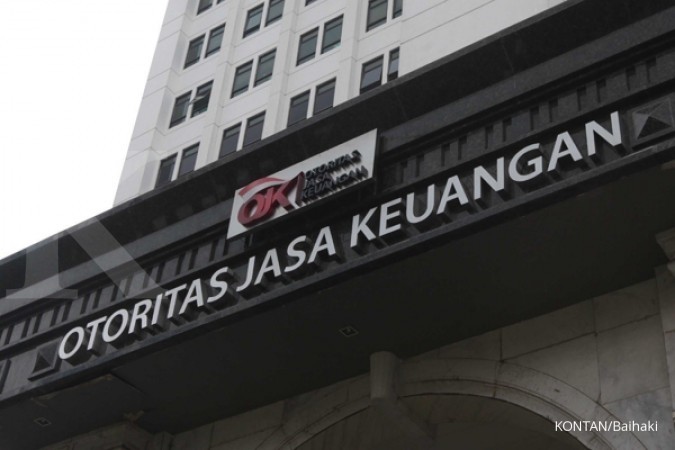Why the Financial Services Authority has lost focus
The main objective of banking supervision is to promote a sound banking system. Unfortunately, the Financial Services Authority (OJK) seems to have lost focus.
Indications are visible in activities performed by the OJK, such as its efforts to actively encourage the agriculture industry to use farm insurance and its commitment to support the development of the agricultural sector through synergy acceleration program inclusion.
Change Size
 This picture shows the front of the Financial Services Authority (OJK) building. The OJK will support Bank Indonesia's efforts to reduce the interest rate over the year. (KONTAN/*)
This picture shows the front of the Financial Services Authority (OJK) building. The OJK will support Bank Indonesia's efforts to reduce the interest rate over the year. (KONTAN/*)
T
he main objective of banking supervision is to promote a sound banking system. Unfortunately, the Financial Services Authority (OJK) seems to have lost focus.
Indications are visible in activities performed by the OJK, such as its efforts to actively encourage the agriculture industry to use farm insurance and its commitment to support the development of the agricultural sector through synergy acceleration program inclusion.
Furthermore, the OJK issues cards to help fishermen record financial transactions. The OJK also actively encourages the financial services industry to expand credit to the agricultural sector. From the perspective of proper state administration, these tasks are really the government’s business.
A loss of focus could undermine the OJK’s accountability. According to Marshaw ( 2006 ), accountability includes who is accountable for what and to whom. So if the social programs fail, the OJK could be held accountable.
The negative impact is the emergence of public perceptions that the OJK is ordered by the government to perform the tasks. Then the independence of the OJK will come into question.
According to the International Monetary Fund (IMF) in working paper WP/02/46, a financial services authority that does not have independence is an important factor in all systematic bank crises.
Another negative impact is that the activities require a lot of energy from the OJK, which could interfere with its core tasks. Hence, these negative effects will eventually lead to public anxiety about the effectiveness of the OJK in overseeing the banking sector.
The financial crisis in 2008 revolutionized many practices of the banking supervisory system. In their book Financial Supervision in the 21st Century, A. Kellermann, J. de Haan and F. de Vries point out that the trend of banking sector supervision is focused on “looking forward”.
Looking forward demands a lot of energy, focus and persistence from financial services authorities. From the various elements of looking forward, there are three elements that should be given deeper scrutiny.
The first is requiring and supervising banks in their efforts in performing the Internal Capital Adequacy Assessment Process (ICAAP) and Internal Capital Adequacy Assessment Process (ILAAP). ICAAP is a capital stress test while ILAAP is a liquidity planning test.
According to the central bank of the EU, ICAAP and ILAAP are reliable risk management tools and if applied correctly, both will provide substantial input in the determination of capital requirements and liquidity.
Therefore, the authorities involved should be able to monitor and maintain the quality of the ICAAP and ILAAP applied by banks.
The second focuses on the question of whether the business model of banks will be sustainable, emphasizing the behavior and culture of financial management. The third addresses risk governance frameworks for banks such as overall risk management functions and independent assessments of risk governance.
The three elements enable financial services authorities to identify the sources of future problems at an early stage and to reduce risks before impacting the financial health of banks.
In the Netherlands, banking supervisors (DNB) are intense and focused at work. Banks are asked how they are dealing with all three of these elements in addition to routine ones.
In that context I asked a chief risk officer at one of the largest banks in the Netherlands about day-to-day business. The officer shared the view that it was very stressful because a lot of reports (ICAAP, ILAAP and the three elements) must be updated.
They very often work overtime. Given the state of day-to-day business in the Netherlands, it is certain that DNB will not have spare time for dealing with activities outside their main tasks.
In discussing the business model in the Netherlands, DNB also communicate intensively with banks. For example, some foreign banks are forced to leave the Netherlands because they are no longer allowed to continue their core business model, namely taking funds in the Netherlands and lending excessively to emerging markets.
In terms of the risk governance framework of banks, DNB often replace members of supervisory boards at Dutch banks as a choice to promote the independence of supervisory boards.
Our financial services authority, on the contrary, is busy with extracurricular activities taking care of farmers and fishermen.
In the context of the ICAAP according to a survey in 2015 conducted by Price Waterhouse Coopers in Indonesia, 53 percent of bankers were of the opinion that they needed further guidance from the regulator especially in stress testing. The results of the survey showed that the OJK has not optimally implemented the ICAAP.
It can also be concluded that the ILAAP, business models and risk governance frameworks for banks have not been communicated optimally. The ILAAP is also essential and less noticeable in Indonesia.
While more than 80 percent of third-party funds can be drawn at any time by customers, it is urgent and imperative to apply the ILAAP promptly and correctly so that banks will be ready to face liquidity shocks.
At the beginning of 2016, the Bank of International Settlements warned that trouble had been brewing for “a long time” but central bank options were dwindling. Many experts argued that the 2008 global financial crisis was not over.
The bubbles arising in the era of 2002-2007 that resulted in global losses (of US$4.1 trillion) were just turned off temporarily by the quantitative easing programs of central banks in the US, Japan, Britain and the EU.
At the same time, global economic productivity from 2009 to 2016 was far below potential to facilitate the bubbles. So it is likely that the bubbles will again shake the global economy with greater magnitude.
The domestic economy can no longer be decoupled from the global economy.
For that reason the OJK should be ready to face this situation by utilizing all of its energy and focusing on looking forward.
***
The writer, who has worked in the Dutch banking sector since 1998 as a credit analyst and accountant, is now a credit risk portfolio analyst at DHB Bank in Rotterdam, the Netherlands. The views expressed are his own.
---------------
We are looking for information, opinions, and in-depth analysis from experts or scholars in a variety of fields. We choose articles based on facts or opinions about general news, as well as quality analysis and commentary about Indonesia or international events. Send your piece to community@jakpost.com.









